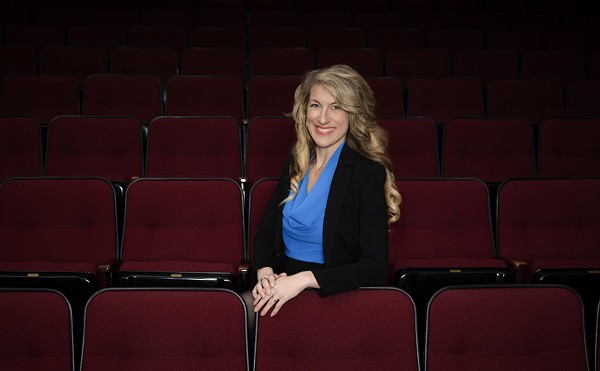This titillating premise — five older women who've been working girls for the past fifty years — is a promising start. The Oldest Profession throws the stereotype of the muffin-baking, sweater-knitting granny out the window; hearing these women talk casually about blowjobs and soixante-neuf forces the audience to acknowledge that sex isn't owned by the young.
For its first professional production, the West End Players Guild mined the St. Louis theater community for golden girls to breathe life into playwright Paula Vogel's precarious script. As Madame Mae, Dorothy Farmer Davis reigns supreme, keeping her stable in line while secretly fighting dementia. As Mae's confidante Vera, Andra Hawkins radiates optimism in spite of all obstacles. Their colleague Lillian (Jane Abling) is a comfortable member of the quintet, moving nimbly from discussing recipes to head-on conflict with the business-minded Ursula (Nancy Lewis). Cindy Duggan, as the recently sprung Edna, triumphs in her jail adventure and keeps her focus on enjoying life for as long as she can.
This group of escapees from New Orleans' infamous Storyville (shut down in 1918 as a political move, causing what Ursula calls "a whore diaspora") now lives on the Upper East Side of Manhattan. Ronald Reagan has just been inaugurated as president, and the dismal economic landscape threatens the ladies' thrifty yet comfortable lifestyles. (But Reaganomic platitudes can't stop nature.) As each scene comes to an end, one of the women dies — but not a maudlin death. The character transforms into a confident echo of a younger self, singing a saucy burlesque song in the style of Bessie Smith or Mae West.
Abling's Lillian is the first to go, and her rendition of "Wild Women Don't Get the Blues" sets the tone for the night: This is a celebration of confident sexuality that defies age — and gravity! As the remaining four cope with her death, Lewis' Ursula emerges as a driving force, determined to improve profitability and adopt a corporate paradigm.
Madame Mae goes next; Davis' "talking blues" rendition of "If I Can't Sell it (I'll Keep Sittin' on It)" brought cheers and impromptu offers of dollar bills from several gentlemen in the audience. With Mae gone, Ursula implements her streamlined business plan: longer work days, no more two-hour lunches, no more than forty-five minutes per customer. Edna's opposition leads to a key moment of discovery for Ursula, and as she contemplates a past mistake Vera and Edna decide to "strike" against management. Ursula dies, and Lewis re-emerges one sexy leg at a time, to sing "He's Just My Size." Clad in a miniskirt that accentuates her lean body (compliments of director Teresa Doggett, who also designed the set and costumes), Lewis proves her strength and versatility as a performer.
The final scenes with Vera and Edna dwindle to discussions of working at McDonald's and trying to survive. Vogel might have wanted to impart a lesson in economics, but the real education here is on the nature of theater. The women's postmortem transformations make the audience look forward to the next character's death, rather than contemplate social or fiscal ethics. After Edna's death Duggan rewards them with a down-and-dirty rendition of "If It Don't Fit (Don't Force It)."
In the final scene, as Vera digs through a garbage can for food, the bevy of dead beauties sings "On the Sunny Side of the Street" from on high in Whore Heaven. Skillfully accompanied by music director Chris Peterson, the ensemble squeezes Vogel's dry script for every drop of life it's got, proving that skilled entertainers are far more interesting than a debate on economics any day.





